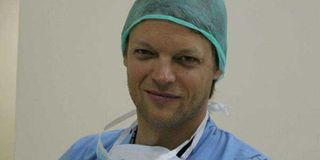Plastic surgeons take issue with licensing of foreign doctors

Dr Tilman Stasch, a consultant Plastic surgeon from Germany. Kenyan plastic surgeons have ignited a battle against issuance of licences to foreign doctors, and have singled out Dr Stasch. FILE PHOTO | NATION MEDIA GROUP
What you need to know:
- They specifically pointed out that they do not want one Dr Tilman Stasch, a German.
- They also argued that the society had been in existence for about 12 years.
Kenyan plastic surgeons have ignited a battle against issuance of licences to foreign doctors to work in the country.
Through the Kenya Society of Plastic, Reconstructive and Aesthetic Surgeons, they fault the director of medical services for allowing foreigners to be issued with licences on grounds that there are no qualified surgeons in the country.
The group said there were certified surgeons and more than 30 medical students at different levels of post graduate training.
MEDICAL BOARD
They specifically pointed out that they do not want one Dr Tilman Stasch, a German, who submitted his application to be allowed to work in private hospitals in the country as a foreign medical practitioner on November 23, 2017.
They claimed that the medical board was not satisfied with his application hence scheduled a peer review assessment meeting on January 10 and intended to issue a verdict in a fortnight.
“We object to Dr Stasch and all other foreign medical practitioners being issued with licences by the medical board and the director of medical services and work permits by the Immigration on misrepresentation of facts that there exists no plastic reconstructive and aesthetic surgeons in Kenya,” said Mr Wafula Simiyu for the society.
TRAINED DOCTORS
According to the group, continued issuance of such licences and work permits to foreign medical practitioners will cause irreparable detriment to the qualified ones locally and will continue to be used as a precedent in future.
In the case documents, two other Kenyan trained surgeons said they intended to protect locally trained doctors from an influx of foreign ones who denied them job opportunities.
They argued that there was no evidence to show that a survey was carried out to establish that no local plastic surgeons were available to offer the required services.
They also argued that the society had been in existence for about 12 years and had been championing interests of locally trained medical practitioners who were studying plastic surgery or were already qualified and were employed by the government or private facilities.





